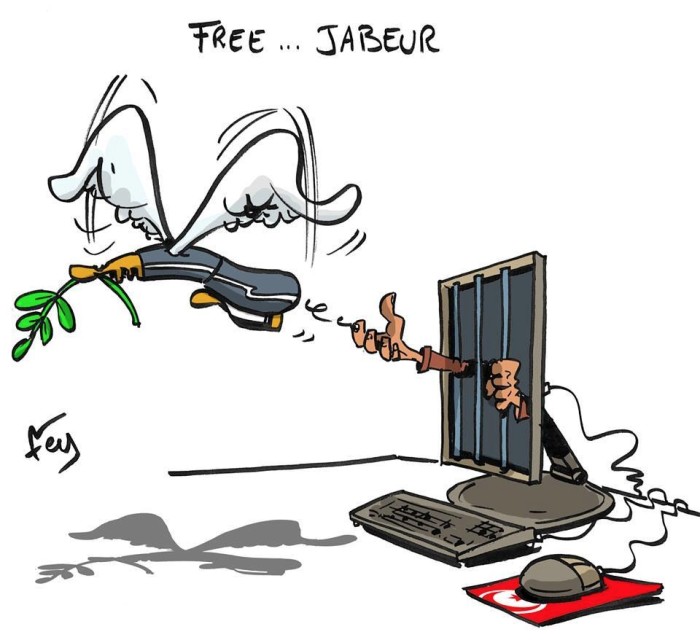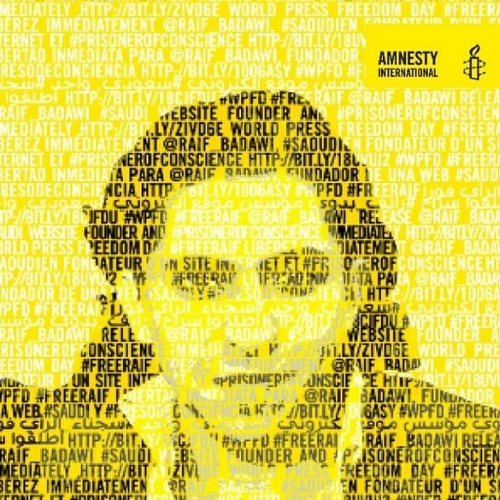
Cartoon in support of Jabeur Mejri, by Fey
Mauritanian blogger Mohamed Cheikh Ould Mohamed was sentenced to death [1] by firing squad on December 24, 2014, for an online article he published over a year ago. This is Mauritania's first death sentence for apostasy since independence in 1960.
In the article [2] entitled “Religion, religiosity and craftsmen,” Cheikh criticised his country’s discriminatory caste system, linking it to what he identified as similar practices from the lifetime of Prophet Muhammad. But he was accused of insulting the prophet.
“[Cheikh’s case] is merely an attempt to muzzle anyone who questions a system based on oppression by using religion as an instrument,” tweeted [3] Mauritanian anti-slavery and racism activist Saidou Wane.
The 28-year-old man appears to be yet another victim of a repressive government in a majority Muslim country that deploys “apostasy” and “blasphemy” pretexts to crack down on those who call for reforms or speak out on political issues. By sentencing Mohamed Cheikh to death, Mauritanian authorities claim that it is Islam or Prophet Muhammad that they are trying to protect. But it is more likely that this punishment will serve only to protect the ruling regime from further political criticism.
Commenting [4] on Cheikh's case, journalist Brian Whitaker, author of the book Arabs Without God [5], writes that religion has become a “political weapon” in Mauritania:
The strange thing about laws against apostasy and blasphemy is that most of the people who fall foul of them are neither apostates nor intentional blasphemers. In practice these laws have very little to do with theology and are mostly used as a pretext for settling political scores or pursuing personal grudges.
Using religion as “a pretext for settling political scores”
Whitaker indeed points to a broader trend across the Arab world. Saudi Arabia and Tunisia, which differ widely both politically and culturally, have seen similar cases in recent years.
Under a theocratic system of government, like that of Saudi Arabia, the lines that separate the religious from the political are blurred. As a result, those who question the status quo or criticize the authorities can face serious accusations on religious (not political) grounds.
How does a regime get rid of political opponents and critics in countries where religion plays an important role in the lives of the majority? One way is to throw them in jail and say they insulted Islam and its Prophet. That way (almost) no one will come to their rescue.

Raif Badawi campaign image by Amnesty International.
Last spring, Saudi Arabia sentenced [6] blogger Raif Badawi to 10 years in prison and 1000 lashes for “insulting Islam” after he launched Saudi Liberals, a website hosting content critical of the country’s senior religious figures and its religious police. The site did not focus on Islam per se, but rather on specific political and religious figures and their actions. Nevertheless, Badawi was convicted of “insulting Islam.”
Saudi women's rights activist Souad al-Shammari [7] posted tweets critical of her country’s male guardianship system, whereby a woman must have the permission of a male guardian to engage in various aspects of her life such as travel, work, and marriage. She stands accused of mocking religious texts and religious scholars.
In Tunisia, which does not have laws that criminalize blasphemy or apostasy, Internet users Jabeur Mejri and Ghazi Beji were sentenced in 2012 to seven and half years in prison over the publication of Prophet Muhammad cartoons on the web. It is worth noting that Mejri and Beji were ordinary Internet users — they were not political activists.
Beji was spared imprisonment as he fled the country before his arrest. However, Mejri spent two years in prison before he was released [8] earlier this year when the former interim President Moncef Marzouki pardoned him.
“Blasphemy is not a crime. Freedom of choice is very clear in the Quran; it says ‘let there be no compulsion in religion,’” Rached Ghannouchi, head of the Islamist Ennahdha Movement in Tunisia, said [9] at an event in Washington D.C. in June 2013.
But Ghannouchi made this statement in Washington D.C. — not in Tunisia. Why didn’t Ghannouchi say “blasphemy is a not a crime” when Mejri was thrown in jail or when his party proposed a law to criminalize “insults to the Sacred” [10]? Along with self-proclaimed Tunisian seculars’ and ‘leftists, Ghannouchi did not speak out in favor of Mejri’s release for fear of a backlash from a conservative population and turning away potential voters.
What does the Quran say about blasphemy?
These governments also seem to ignore the fact that while Islam does not encourage blasphemy, it does tolerate it. In fact, the Quran does not prescribe a punishment for it.
Prophet Muhammad and his early followers faced persecution and ill-treatment by their contemporaries, including insults, mockery and defamation. But the Quran instructed them to be patient and simply turn away from blasphemous conversations, rather than to condemn them.
…And you will surely hear from….those who associate much abuse with Allah. But if you are patient and fear Allah – indeed, that is the matter [worthy] of determination. [chapter 3, verse 186]
And when you see those who engage in [offensive] discourse concerning Our verses, then turn away from them until they enter into another discourse. [chapter 6, verse 68]
It is the same for apostasy. The Quran does not prescribe any worldly punishment for those who decide to convert from Islam to another religion or no religion at all. “Let there be no compulsion in religion” and “the truth is from your Lord, so whoever wills – let him believe; and whoever wills – let him disbelieve,” the Quran states.
It seems clear in the Quran that apostasy and blasphemy do not require punishments such as the death penalty or lashing — yet authorities in countries like Mauritania, Saudi Arabia and Iran continue to do the opposite. It seems the motive is more rooted in politics than religion.
“Arab rulers act as if Islam is in danger…maybe they are afraid of the collapse of their thrones,” Tunisian blogger Khaoula Frehcichi wrote in a blog post [11]. “They know very well that criticising the religious institution is the first step to unsettle their regimes.”